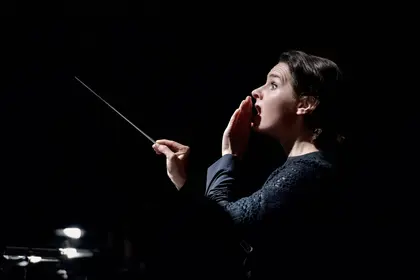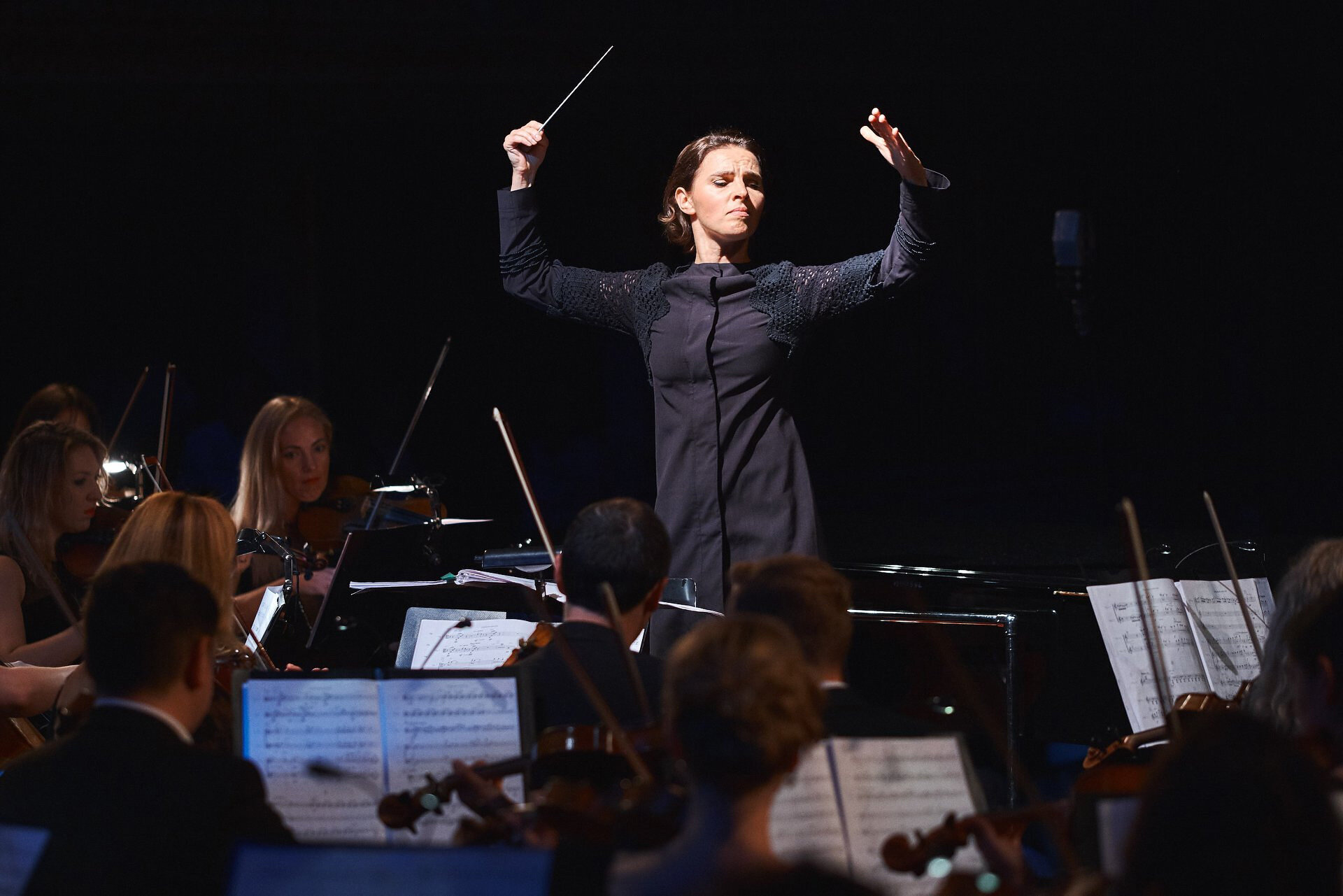Ukrainian conductor Oksana Lyniv has made history in the male-dominated world of classical music. Twice.
First, she became the first female general music director of the Austrian Graz Opera since its founding in the 17th century.
This year, she is set to become the first female conductor at the prestigious 145-year-old opera event, the Bayreuth Festival, started by none other than iconic German composer Richard Wagner.
Lyniv, 43, says that women lead only about 3% of the world’s top orchestras. She believes she made the cut thanks to her dedication and tireless improvement. But she still finds the achievements overwhelming.
“There are no words to describe what I feel,” Lyniv told the Kyiv Post.
Based in Düsseldorf, Germany, she now works as a “freelance conductor,” performing at multiple operas all over the globe. Despite her busy schedule, Lyniv spares the time to travel home and popularize classical music in Ukraine through her own initiatives.
“I feel the need not only to achieve something for myself, but also to invest my opportunities and contacts in new projects in Ukraine,” she says.
A man’s world
Lyniv was surrounded by music since the earliest days of her life.
She was born into a family of music teachers in a small town of Brody, Lviv Oblast, located 450 kilometers west of Kyiv and inhabited by about 23,000 people. Two of her other family members, including one of her grandfathers, were conductors.
It took Lyniv exactly one visit to a music school to decide she would carry on the ancestral tradition and master the art of directing a musical performance.
“I am the third generation of conductors in our family,” she says proudly.
Lyniv’s academic studies taught her that she was entering a “a man’s world,” as she was the only female student enrolled in the opera and symphony conducting course at Mykola Lysenko Lviv National Music Academy.
Upon graduation, Lyniv hit her first milestone, becoming a finalist in a prestigious conductor contest held in the Bamberg Symphony opera in Germany. Placing third in the competition opened up new opportunities for Lyniv — she was hired as an assistant at the Bamberg Symphony. Soon after that, she started postgraduate studies at Dresden’s Carl Maria von Weber College of Music, which further sharpened her skills, she says.
Lyniv’s career took off when she joined Ukraine’s oldest opera, Odesa National Academic Theater of Opera and Ballet, as a deputy chief conductor, diving deep into the profession for the first time. After five years in Odesa, she hit another “first” her appointment as general music director at the Bavarian State Opera in Munich.
Lyniv says that few understand a conductor’s role but it carries a lot of responsibility. Conductors serve as intermediaries between the orchestra and the audience, between the composers of the past and the modern day.
“With every movement of my hand, I must, like a magician, hold everyone’s attention on the tip of my baton,” Lyniv says. “I must create such interpretations that will be able to transfer people 200-300 years back in time.”
Historic achievements
Lyniv has always done more than what was expected.
When she first arrived in Germany, seeing the high bar of opera conducting pushed her to work harder. She practiced hand movements day and night to master the perfectly choreographed, airy performance. Even during long, 3.5 hours operas, when hands may sweat, the movements need to stay light and precise, she says.
Through the years, Lyniv also learned what she calls seeing beyond notes. To better understand the composers and feel what prompted them to write a piece, she studies their biographies before conducting their music.
A big step for Lyniv was the decision to compete for the job of chief conductor at Graz Opera.
There were seven candidates for the position, and Lyniv was the only woman. In the first round of the competition, she had to perform for a full audience without rehearsing with the orchestra beforehand. Her hard work paid off, and Lyniv was selected to head the prestigious opera for the 2017-2018 season.
She eventually stayed there for two more seasons until taking her career to a new level. Lyniv believes that the success of a conductor should not be limited to one country or theater and she finally granted herself the freedom to work with operas and events all across the globe.
“I allowed myself to be a freelance conductor,” she says.
One of her most prominent performances was in 2020 at Berlin State Opera with a 2,500 audience. It was an unforgettable moment with a very supporting crowd, Lyniv says. “There was a burst of screams.” But the performance was no less defining for Berlin Opera itself, which that night hosted a female conductor for the first time in its centuries-long history.
Though based in Düsseldorf, Lyniv spends most of her time traveling around.
Her extremely tight schedule often includes three-to-four concerts per month, all in different countries. With every performance requiring several weeks of preparation, work takes up pretty much all her time. In May alone, Lyniv had concerts in Odesa, Rome and Bologna and rehearsals in Paris.
She says that it was even hard to find room for her wedding. To be able to get married, Lyniv canceled one of her performances that was scheduled for November 2021 in Leipzig, Germany.
This summer, Lyniv is set to give another history-making performance. She will be the first female conductor at the Bayreuth Festival, Germany’s iconic event dedicated to Wagner’s heritage that attracts thousands of people annually. The waiting time for its sought-after tickets sometimes takes years.
At the 2021 Bayreuth Festival, Lyniv will present a new production of Wagner’s “The Flying Dutchman.” The five-week series of performances will begin on July 25.
Promoting classical music
Despite her busy schedule, Lyniv manages to find time to give back to her home, Ukraine, through several of her initiatives.
One of them is LvivMozArt, an annual festival that brings some of the world’s best musicians to the western Ukrainian city of Lviv.
Lyniv is the co-founder and the artistic director of the event. She says that she launched it in 2017 to promote Ukraine on the international music map. Another goal was to highlight the historical connection between the Ukrainian and European cultural traditions.
One such connection even inspired the festival’s name, when Lyniv discovered that the youngest son of iconic Austrian composer Wolfgang Amadeus Mozart lived in Lviv for 30 years. As a pianist, composer and conductor of the Lviv City Theater, Franz Xaver Wolfgang Mozart influenced the city’s musical development, Lyniv says.
LvivMozArt combines contemporary academic music and classical pieces performed by musicians from multiple European countries, the United States and South Africa. Its last pre-pandemic edition in 2019 drew 9,500 spectators. The next festival will take place on Aug. 26-29.
According to Lyniv, she gets asked about LvivMozArt at nearly every interview abroad, as the event keeps growing its influence.
“LvivMozArt became the calling card of (Ukraine’s) cultural diplomacy in the world,” she says.
Another initiative aims to cultivate people’s love for classical music from a very young age and support young musicians in Ukraine.
In 2016, Lyniv founded and became the principal conductor of the Youth Symphony Orchestra of Ukraine. It now unites 70 beginning musicians, aged 12 to 22, from all across Ukraine.
“It was my big, old dream,” Lyniv says. “I really wanted to give children a chance.”
The orchestra performed at a number of events in Ukraine and abroad, but its proudest moment was being selected for the largest young orchestra festival in the world, the Young Euro Classic in Berlin.
At the time the orchestra existed for just a bit over a year but it aimed high by choosing a piece considered to be difficult to perform even for advanced adult collectives. They mixed Ludwig van Beethoven’s “Symphony No. 7” with pieces by Ukrainian composers.
“Everyone was amazed, the applause lasted for almost 10 minutes,” Lyniv says.
As the conductor continues to help youth and promote Ukrainian music abroad, she says she has another goal in mind.
“An important concept of my work is to break the stereotype that classical music is something conservative, intended only for philharmonic halls and only for a closed circle.”
You can also highlight the text and press Ctrl + Enter





